Discover more book recommendations
Meet our Book Doctor... Ambrose Parry, author of the The Way of all Flesh
In our Book Doctor feature, we welcome a guest to prescribe just the right read for any mood or occasion.
Ambrose Parry – author of Raven and Fisher mysteries – is a pseudonym for bestselling author Chris Brookmyre and consultant anaesthetist Marisa Haetzman. They've joined us to prescribe the best books for booklovers.
I love reading historical fiction about ordinary people, but don't like books set during a war. What can you recommend? – Claire
War is an easy enough subject to avoid, but the definition of ordinary people is more problematic. Given that it sometimes feels like sixty percent of all British historical fiction is about the Tudors, perhaps you mean people other than royalty. In which case, I can recommend Any Human Heart by William Boyd, an account of a life that is both ordinary and extraordinary that spans most of the major events of the twentieth century. There is also The Alienist by Caleb Carr, which depicts a psychiatrist and newspaper reporter attempting to track down a serial killer in late nineteenth century New York using the latest techniques in forensic detection.
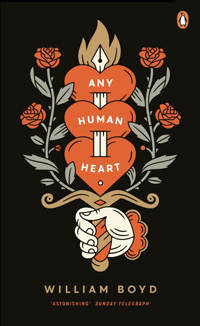
I love reading the same books again and again. How can I start a new series? – Thakkar
The reason I am inclined to read certain books again and again is that I come to love an author’s voice and characters, and though I love the familiarity, I sometimes wish the author was more prolific and that each of his books was a thousand pages long. If that applies to you too, I have just the thing. I can recommend two writers whose voice and style will grab you right away, and whose characters will become as real to you as family. The first is Mick Herron, whose Jackson Lamb series is about intelligence service wash-outs, sent to a place called Slough House to be treated appallingly in the hope that they will resign. However, the brilliantly monstrous and monstrously brilliant Lamb always finds ways to make them useful.
My second recommendation does in fact write books a thousand pages long. Neal Stephenson's Baroque Cycle (comprising Quicksilver, The Confusion and The System of the World) mixes real and fictional historical characters in a dazzlingly researched and boundlessly entertaining swashbuckling epic about the beginnings of modern science, commerce, philosophy and the foundation of the Royal Society.
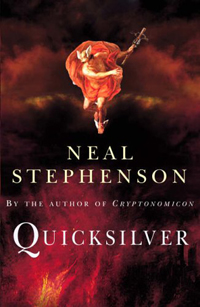
I love reading and have eclectic literary tastes but am quite time poor. As I have to read some weighty books for work (I'm a curate in the Church of England), I like to read fiction that isn’t too heavy, but that does make me think and possibly includes themes of faith. Authors I love include Sally Vickers, Michele Roberts, Joanna Harris and Herman Hesse. What new authors do you suggest I try out? – Chris
Works of fiction that aren't too heavy but retain the capacity to make you think – isn’t that just the very best kind? If you haven’t read him before I would recommend Robertson Davies, perhaps starting with The Rebel Angels. His writing is wonderful, witty and wise, always retaining a lightness of touch as he explores themes of faith and academia. The Heart’s Invisible Furies by John Boyne is about a young man attempting to find his place in the world. It is heart-warming and compassionate. This Thing of Darkness by Harry Thompson which follows the exploits of Robert Fitzroy, captain of the Beagle as he attempts to chart the coastline of South America, forced to defend his religious beliefs when they are challenged by the ship's naturalist Charles Darwin. Phenomenally good and possibly one of the best works of historical fiction that I have ever read.
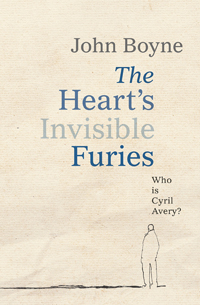
I'm disabled and stuck in bed a lot, unable to do anything, so I rely on audiobooks to both keep me going and to provide me with my much-needed reading kick. But some people think that audiobooks are "lesser" than physical books, or even eBooks. Am I being unfair, calling it "reading"? Or are they being unreasonable? – Erika
I think that there is an enduring love for books, but the way stories are consumed is changing. The very notion that eBooks or audiobooks are in some way less worthy than their physical counterpart is rather strange and perplexing. Is there a perception that greater intellectual effort is required to read a book than to listen to it? Does a physical book enable greater comprehension than an eReader? I don't think so. Books are wonderful things, but does it really matter how we absorb the information contained within their pages? Listening is as much a skill as reading and audiobooks have the added dimension of spoken word performance. I suggest that you dismiss the concerns of the purists and continue to consume the books that you love in whatever way you choose.
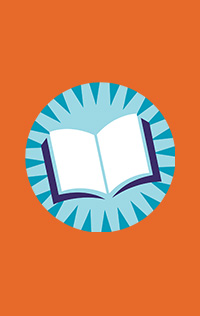
How do you stick with a book that you're not enjoying? – Katie
Don’t. Life is too short to persevere with a book that you are not engaged with. Reading is a subjective experience and for whatever reason some books just don’t hold your attention. This does not necessarily reflect badly on the book in question or on the reader. Reading shouldn’t be a chore. If a book isn’t doing it for you put it down and pick up something else. We are fortunate that there is such a literary cornucopia available to us. I often encounter people who were put off reading by their schooldays, finding that their English texts were like a prescription to put children off literature. I fear that it is a legacy of our childhood that we feel it is a failing on our part if a book "defeats" us, but if reading feels like a struggle, it means the book that is wrong for the reader, not the other way around.

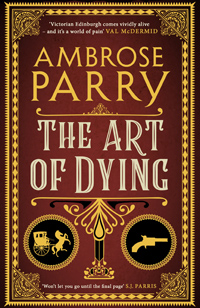
About The Art of Dying by Ambrose Parry
There’s a fine line between kill and cure.
Edinburgh, 1849. Despite Edinburgh being at the forefront of modern medicine, hordes of patients are dying all across the city, with doctors finding their remedies powerless. But it is not just the deaths that dismay the esteemed Dr James Simpson. A whispering campaign seeks to blame him for the death of a patient in suspicious circumstances.
Simpson’s protégé Will Raven and former housemaid Sarah Fisher are determined to clear their patron’s name. But with Raven battling against the dark side of his own nature, and Sarah endeavouring to expand her own medical knowledge beyond what society deems acceptable for a woman, the pair struggle to understand the cause of the deaths.
Will and Sarah must unite and plunge into Edinburgh’s deadliest streets to clear Simpson’s name. But soon they discover that the true cause of these deaths has evaded suspicion purely because it is so unthinkable.